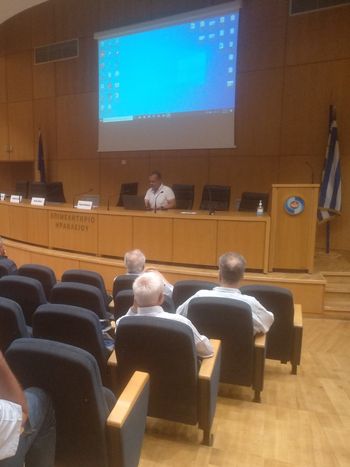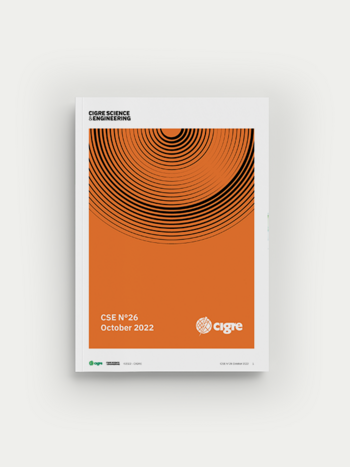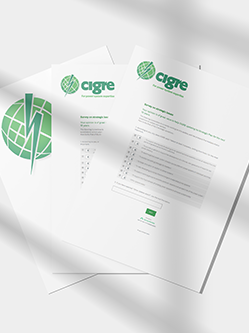The advantage of members sharing data to leverage global networks
CIGRE’s members deliver realisable benefits to the community and industry by their work to advance power system understanding. Data is essential to most projects and working groups. However, how can CIGRE members build relationships of trust with industry stakeholders when collecting commercially sensitive data?

By Dan Martin (NZ) and Stefan Tenbohlen (DE)
CIGRE Working Group A2.62
Promoting the sharing of data by establishing trust
Data can be commercially sensitive, so it is essential to agree on its use and to manage confidentiality where required. An organisation may place caveats on the use of their data. While it is a requirement of a Working Group Chair to respect any conditions, the members of the group should also be aware of their ethical responsibilities when handling data. It is important that these values are clearly communicated and consistently enacted. Integrity and adherence to professional standards is key to the mutual trust needed for the effective functioning of CIGRE as a member’s organisation. This is why it is a provision of CIGRE that members who bring the association into disrepute will be excluded. The establishment of trust builds on the concepts described in the Code of Ethics produced by the CIGRE Science and Engineering journal [1]. Another aspect of the CIGRE compliance guide is “Confidential information of all parties is being respected. No Member or their Representatives will be encouraged or compelled to share confidential information” [2]. National engineering societies also promote ethical behaviour. For instance Engineering New Zealand makes the explicit requirement of its members: “You must be careful not to disclose any confidential information without the relevant party’s agreement” [3].
An example of a Working Group ensuring confidentiality is the approach taken in the Joint D1/A2.47 Working Group for Advances in DGA interpretation where:
“The name of the transformer owner and transformer manufacturer, as well as any internal identification number, were removed from the merged database. Furthermore, access to it was given to only one member of the WG, who was in charge of doing calculations on it, and subject to a strict confidentiality agreement of not circulating the merged and individual databases to anyone.”
The organisations were instructed how their data would be kept confidential, how it would be used, analysed and reported in the subsequent technical brochure. Other Working Groups will take different approaches to data-handling, and this flexibility can be a boon, allowing groups to reflect the needs of their project and members. However, what must remain consistent is that all groups commit to the ethical values of appropriate confidentiality and consider how to enact that in their processes.
A manager may be concerned about possible negative consequences from releasing sensitive data, and may consider just waiting for the brochure using everybody else’s data. It is expected and proper for companies working in the space of supplying essential services, and in a safety critical environment, to be highly attuned to risk. However this is a short-termist approach because it erodes the mutuality relied upon for CIGRE to improve engineering practices. In the longer term the organisations involved can reduce their organisational risk by committing to support this mutual aim. A more immediate downside is that they do not get the benefit of their data being evaluated, and other data may not be relevant to their situation. Many corporations now have statements for sustainability in their corporate strategy, where they must consider long-term impacts of their decision making. In the current environment, with changing power mixes and consumer technologies, a cooperative effort through CIGRE is an efficient way to meet these challenges, the resource of individual companies. Understanding how other parts of the power sector are approaching this helps achieve best practise.
Establishing business value: How an organisation benefits from data sharing
Better outcomes can be achieved from more comprehensive datasets. Some problem solving requires more data than one organisation is likely to have. Surveys of reliability and failure often require more data than one utility can provide for a statistically significant result. An exemplar is our A2.62 Working Group collecting power transformer failure data, where the raw data is also kept confidential within the Working Group and only the aggregated evaluation will be presented. At the beginning, a focus was placed communicating to the stakeholders confidentiality, permitted purpose and accessibility.
Openness, transparency, and multiple perspectives from outside an organisation helps ensure that internal working practices are up to date. For example an organisation can share findings of projects and receive objective feedback. Professional engineering bodies encourage peer review as part of their standards, e.g. [3]. This often takes place in national panel meetings, where members present their projects and invite feedback and comments.
Additional insights from feedback and engaging with other experts provide benefits. This keeps the skillsets of an organisation’s employees up to date with the latest engineering challenges, and prevents falling behind. CIGRE actively promotes contact between experts using various channels such as conferences, symposiums and colloquiums.
Summary
Sharing data in a managed manner brings many benefits which include the following: A global coordinated effort through CIGRE to improve engineering practices with minimal resource being required from one organisation. Leveraging off skills from outside of the organisation to resolve an issue. Promoting corporate sustainability through more comprehensive datasets being available to improve engineering practices.
CIGRE is a knowledge sharing organisation for professional engineers with the aim to improve engineering practices. To be effective in this an environment of mutual trust and cooperation is required, and this can be pinned to the integrity of its members in consistently enacting the values and standards expected of professional engineers, e.g. transparency, discretion, openness to feedback.
For data sharing to happen effectively CIGRE members need to think about the level of confidentiality required by an organisation for them to contribute. Trust is built by following an agreement with industry and not deviating, for instance not sharing the raw data without prior arrangement. State how exactly the data is to be analysed, aggregated and evaluated, with any conditions such as providing publications in advance for comment. During the project with ongoing communication show that the data is being well managed with exciting outcomes from the interpretation.
Banner & thumbnail credit: Photo by John Schnobrich on Unsplash
- [1] Code of ethics, 2016: cse.cigre.org/about/code-of-ethics
- [2] [2] Compliance guide of CIGRE, 2014: www.cigre.org/userfiles/files/About/COMPLIANCE_GUIDE_of_CIGRE_20140725.pdf
- [3] Practice note 8 being ethical, Engineering NZ, 2019: d2rjvl4n5h2b61.cloudfront.net/media/documents/Practice_Note_8_Being_Ethical.pdf





